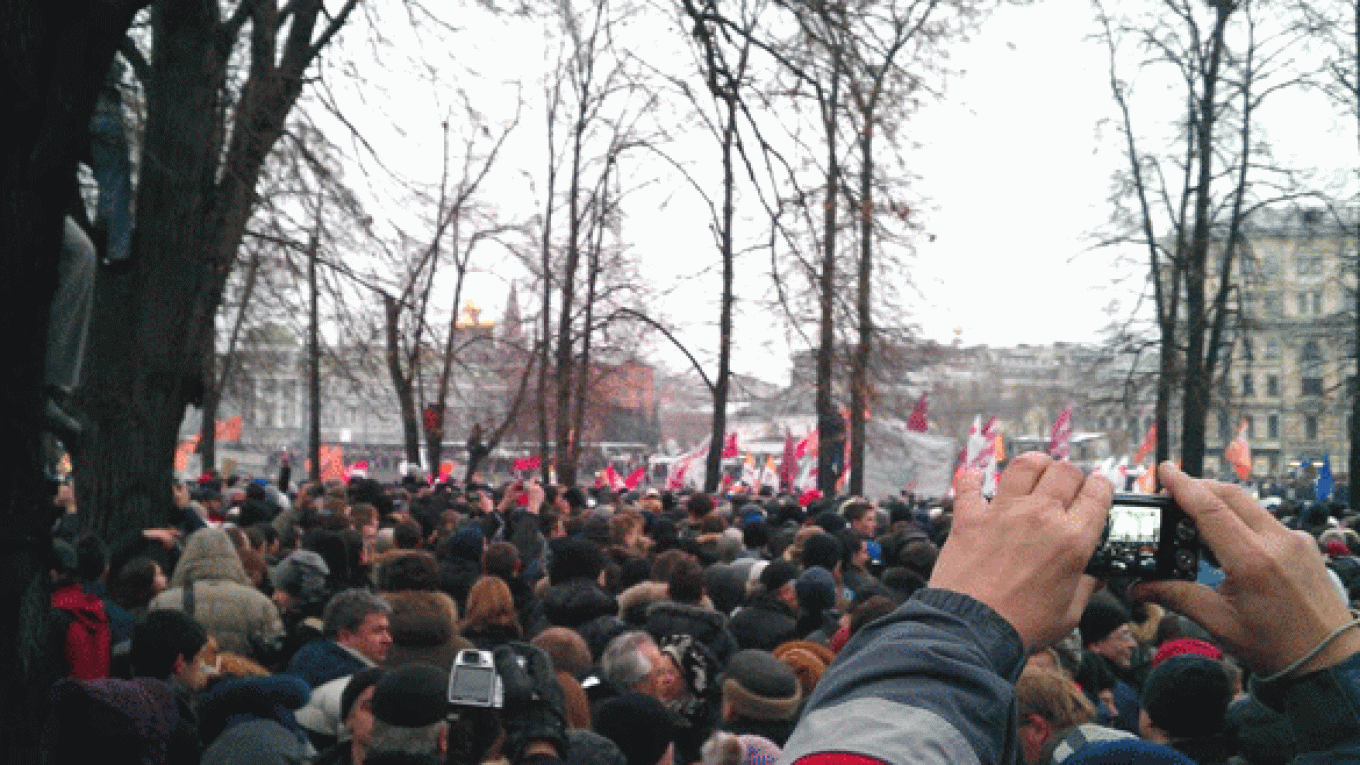Tens of thousands people descended on the center of Moscow on Saturday for a protest against election fraud and to demand new elections in what was one of Russia's biggest demonstrations since the early 1990s.
Despite tensions and fears of violence in the build-up to the protest at Bolotnaya Ploshchad, which sits across the Moscow River from the Kremlin, the event had a festive atmosphere. Many brought homemade signs ranging from the abusive to the funny and the crude. People wore white ribbons and carried white carnations, symbols of the growing protest movement.
The meeting and its speakers were notable for a wide spectrum of political opinions, from liberal and democratic to communists and left-wing radicals, a mix that would normally be explosive at a political rally.
Journalist Oleg Kashin read out a letter from Alexei Navalny, the jailed anti-corruption blogger whose term for United Russia, "the party of crooks and thieves," has become the much-used slogan of the movement.
"The greatest weapon that we have is the feeling of our own dignity," Navalny wrote in the letter. Navalny was sentenced to 15 days in jail after Monday's protest against the State Dumas elections results. Navalny's face was on posters at the protest, and his "crooks and thieves" phrase was repeatedly used throughout the meeting as a chant.
"Putin is a thief," "Re-elections!" an d "A Russia free of Putin!" were regularly chanted by a crowd that remained cheerful and polite on a gray, cold day with intermittent snow. "Bear, leave!" — a play on the last name of President Dmitry Medvedev — also sounded out to laughter in the crowd.
Estimates of how many people attended the meeting ranged from 25,000 to 100,000. Crowds spilled out on to all sides of the square and over the Vobootvodny Canal. Protesters also were packed tight on the Luzhkov Most, a small footbridge that leads to the Tretyakovskaya Gallery. At one point, police warned that the bridge was in danger of collapsing because of the numbers.
A large banner, reading "Crooks and Thieves, Give Us Back the Elections," was hung on the bridge.
"United Russia should have received 20 percent, maximum," said Vladimir, 25, a linguistics student, who said that he had been apolitical until recently. "I'm not a super-active protester, and I'm pleased with the non-aggressive mood here," he said.
The meeting set forth four demands, including the holding of new elections and the sacking of Vladimir Churov, the head of the national elections committee.
"This hasn't been seen since the 1990s," Vladimir Milov, a former deputy finance minister and opposition activist, said of the protest. "This will have an effect on the authorities."
"Last week, people thought we were crazy when we said United Russia would get less than 50 per cent," said Milov, predicting that the presidential election in March would go to a second round and that Navalny needed to be persuaded to stand for election against Putin.
The crowd was mainly young, with a large degree of hip youth, but also saw a wider range of ages and more female faces than the first election protest on Monday.
The mood was captured by Tatyana Lazereva who warned the crowd away from violence by saying, "Let's act so that our mothers will be proud and our children won't be ashamed."
At the end of the meeting, opposition politician Vladimir Ryzhkov called for a new protest on Dec. 24, saying there would be twice as many people at that one.
A few protesters wore masks from "V for Vendetta," which have become a symbol for the Occupy Movement worldwide. The general atmosphere at Bolotnaya Ploshchad, however, was radical but not revolutionary. Boos broke out when a nationalist talked of "a new Russian revolution." Some in the crowd then began shouting "No revolution!" in response.
One man just held up a copy of the Russian Esquire, which features a photo of Navalny on the cover of its latest issue. Another showed off the phrases, "'I didn't vote for these bastards!! I voted for different bastards!! Recount!"
Some protesters advertised what they said were the real results of polling stations. One poster read, "146 per cent of Muscovites want honest elections" — a reference to a report on election night in which the percentages for one region added up to 146 per cent.
A Message from The Moscow Times:
Dear readers,
We are facing unprecedented challenges. Russia's Prosecutor General's Office has designated The Moscow Times as an "undesirable" organization, criminalizing our work and putting our staff at risk of prosecution. This follows our earlier unjust labeling as a "foreign agent."
These actions are direct attempts to silence independent journalism in Russia. The authorities claim our work "discredits the decisions of the Russian leadership." We see things differently: we strive to provide accurate, unbiased reporting on Russia.
We, the journalists of The Moscow Times, refuse to be silenced. But to continue our work, we need your help.
Your support, no matter how small, makes a world of difference. If you can, please support us monthly starting from just $2. It's quick to set up, and every contribution makes a significant impact.
By supporting The Moscow Times, you're defending open, independent journalism in the face of repression. Thank you for standing with us.
Remind me later.






